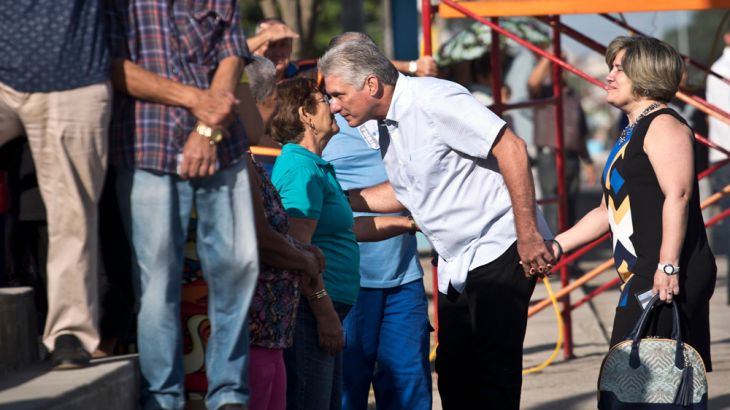Cuba vote opens final chapter of Castro era
Eight million Cubans expected to ratify 605 candidates in a vote for the first president who isn’t a Castro in 60 years.

Cubans voted to ratify a new National Assembly, a key step in a process leading to the elevation of a new president – the first in nearly 60 years from outside the Castro family.
Sunday’s general election is the first since the death in 2016 of Fidel Castro, and marks the beginning of major change at the top in Cuba.
Keep reading
list of 4 items‘Absolute power’: After pro-China Maldives leader’s big win, what’s next?
Solomon Islands pro-China PM Manasseh Sogavare fails to secure majority
Pro-China party on course for landslide victory in Maldives election
The new members of the National Assembly will be tasked with choosing a successor to 86-year-old President Raul Castro when he steps down next month.
Castro voted in the southeastern province of Santiago de Cuba while his first vice president and likely successor, Miguel Diaz-Canel, cast his ballot in the central Santa Clara province.
“The triumphal march of the revolution will continue,” Diaz-Canel said after voting, promising “peace, liberty, independence and the sovereignty of the people will endure”.
Raul Castro took over in 2006 from his ailing brother Fidel, who had governed since seizing power during the 1959 revolution.
|
|
Eight million Cubans are expected to turn out to ratify 605 candidates for an equal number of seats in the Assembly, a process shorn of suspense and unique to the Communist-run Caribbean island nation.
“They’re the most important elections of recent years, because we are going to vote for new people who will govern from then on,” day-care center guardian Ramon Perez told AFP news agency.
‘Right moment’
The change “will be a challenge but it’s the natural law of life. We get old and have to retire”, said retired lieutenant colonel Rigoberto Celorio, 82.
“This is the right moment. Raul will stay on as first secretary of the Communist Party, so whoever comes out of the process will be well oriented.”
Julio Cesar Guanche, a professor of law and history, said on the OnCuba website that the legitimacy of the country’s next president would come more from “institutional performance” than personal history such as involvement in the 1959 revolution.
Turnout for the election is expected to be around 90 percent. Although voting is voluntary, not voting is frowned upon and going to the polls is considered an act of sovereignty and of “revolutionary affirmation.”
The final results will be known on Monday.